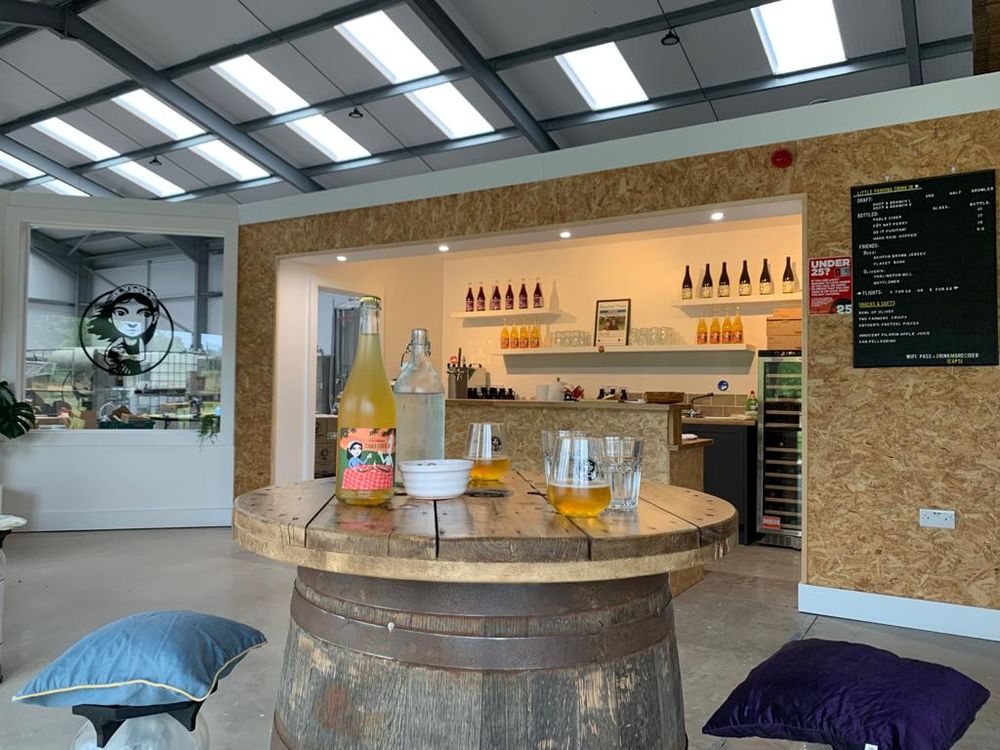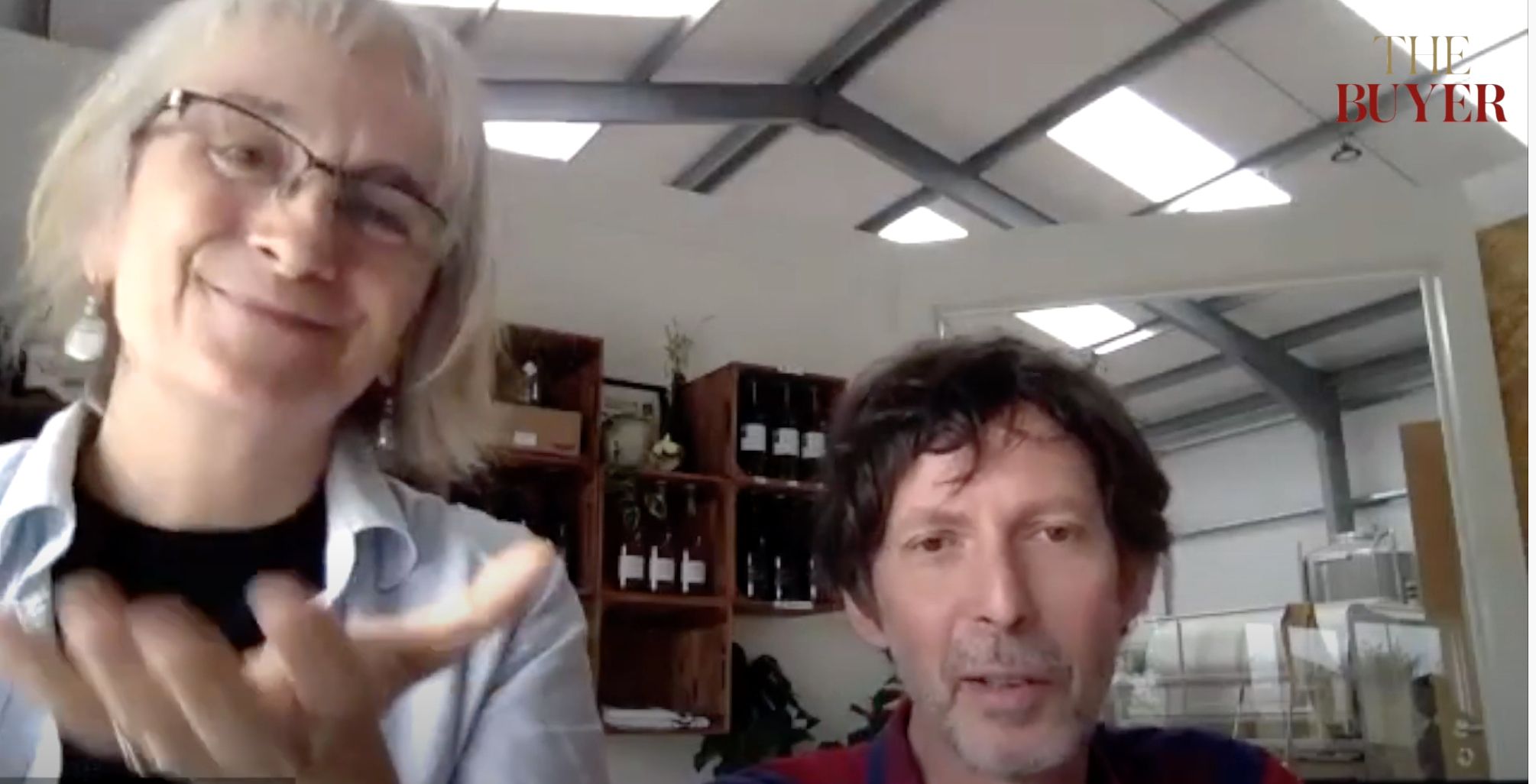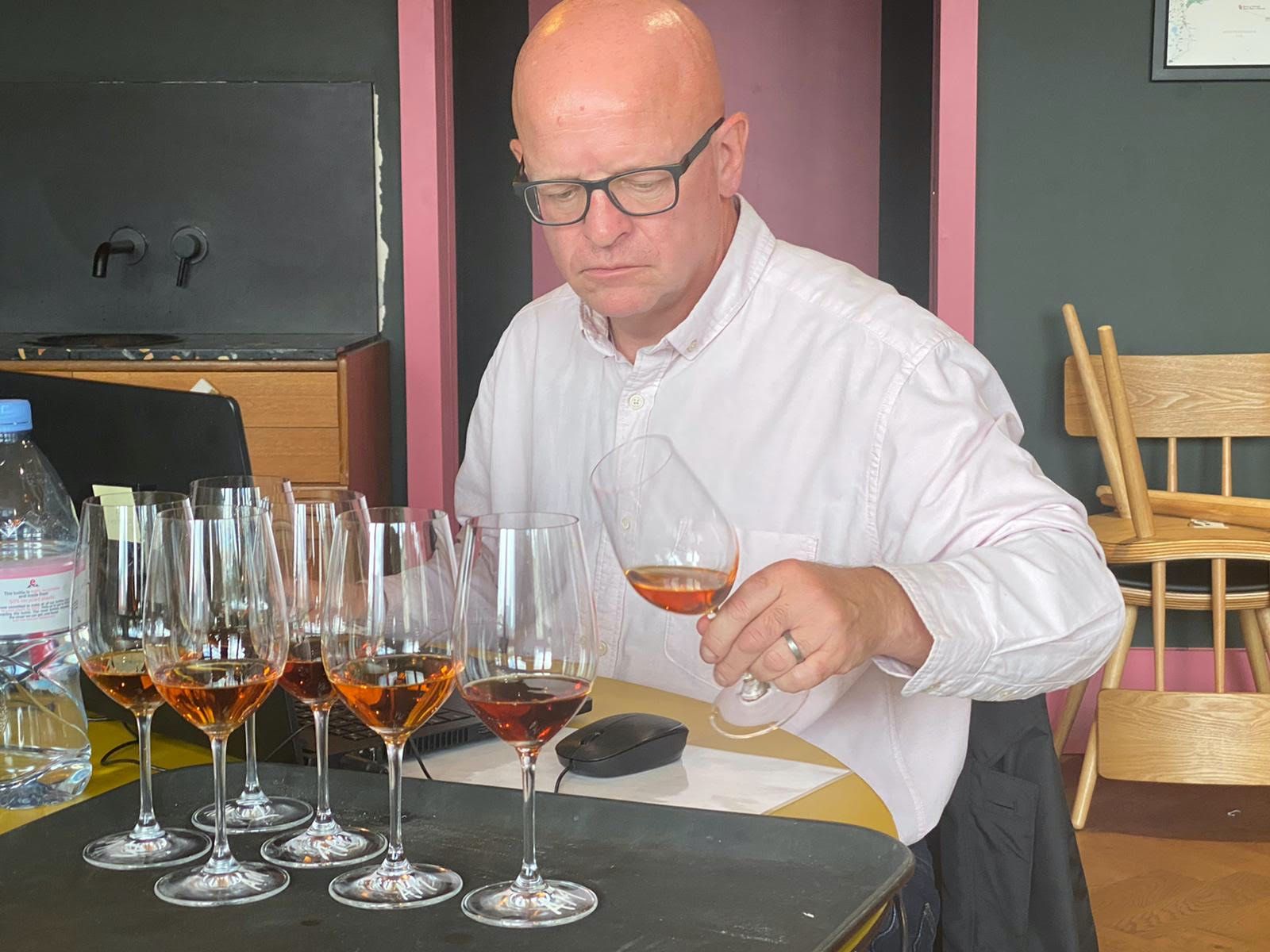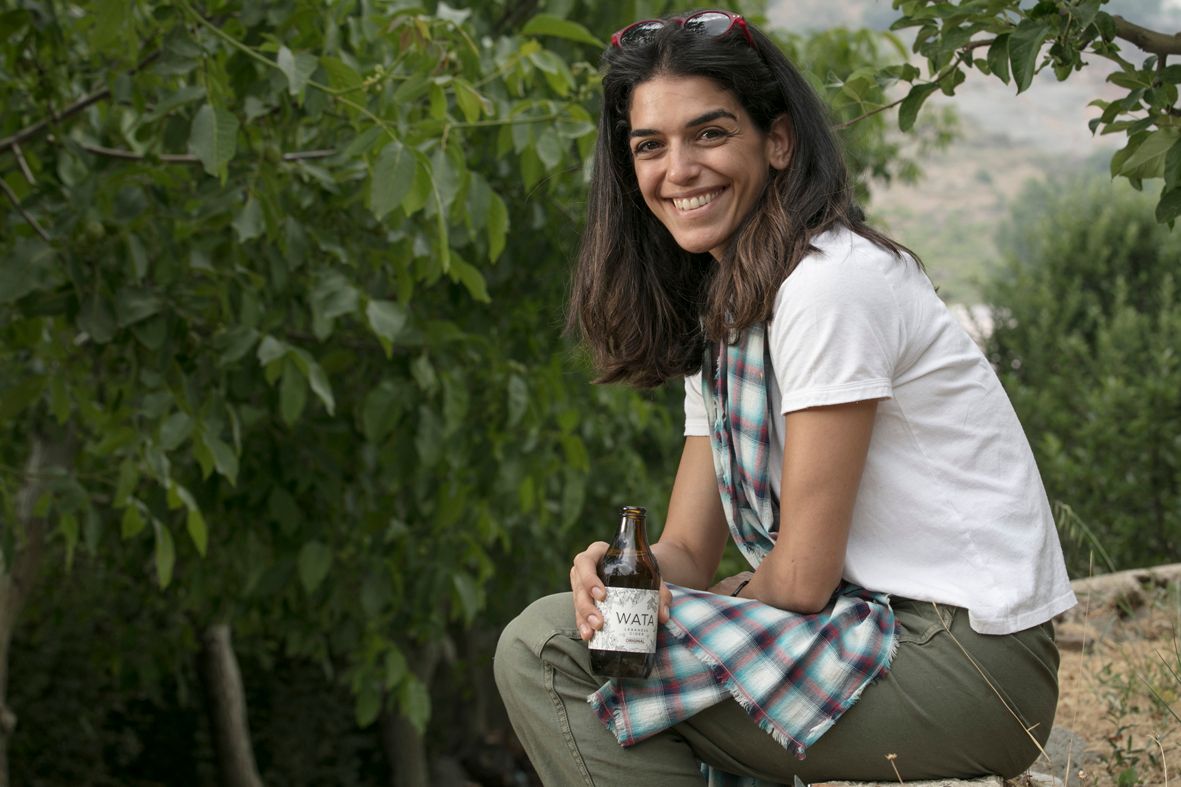James and Susanna Forbes are racking up a number of firsts for what they are doing at Little Pomona and building up a community of cider lovers at the same time.
(Click here to watch the full interview between Richard Siddle and Susanna and James Forbes)
James and Susanna Forbes have done their fair share of talking about drinks in their working lives. Be it, in James’ case, selling and promoting wine, or, for Susanna, travelling the world writing about wines, beers, spirits and ciders for a range of drinks publications, most notably Imbibe.
But, secretly, what they really wanted to do was to stop the talking, selling and writing and actually make their own mark on the drinks industry – and in particular the burgeoning UK craft drinks scene – by starting up their own drinks business.
Not that they really knew what that meant. James admits he certainly did not set out with a vision to make cider, in fact, he never used to drink it before, preferring only wine or beer.
Thoughts, though, started to fall into place when they embarked on a tour of Britain as part of the research that Susanna was doing for her ground breaking (and now retired) DrinkBritain tourism website, which was the first of its kind to really promote and shine the light on the fast growing UK crafts drinks scene.
Epiphany moment
It was when they travelled through Herefordshire and started to visit local cider producers and taste the fruit from the trees that they started to take to the idea of making their own cider. James admits it was a bit of an “epiphany” moment for him to taste the quality and diversity of the fruit for the first time. “That’s when it started to make sense to me,” he adds.
What they know now is that in cider making terms Herefordshire is “like the left bank for Bordeaux” with the best quality fruit and where most of the top cider makers are.
And, as Susanna says, cider, like wine, “is about getting the best fruit, and who you work with”. It therefore made, when they finally decided to give the business a go, to look to set up home and their business in Herefordshire.
(Click here for James and Susanna Forbes on Herefordshire and the epiphany moment to make cider there)
It took a further two years for them to find the find the right location, for as Susanna says, Herefordshire is also similar to Burgundy in that there was so many nooks and crannies to explore, each with varying degrees of potential when it comes to apples and cider making.
That was back in 2014 when they originally moved from their home in Epsom to their initial base and “dream orchard in Thornbury, North Herefordshire” made up of 120 trees with four classic cider apple varieties. Their inspiration was clear. Their “quest quest was to work with the best possible fruit using natural methods to fashion ciders and perries with true flavours”.Ciders with enough character and structure to match with food.
It was also a brave step into the unknown, but, says Forbes, also in keeping with their past careers in looking to “champion the underdog” be it through Wines of Argentina or undiscoveredBritish drinks.
Stepping up
Gradually they both started to arm themselves with the knowledge and credentials needed to actually think about making quality drinks of their own. Susanna added short Plumpton College viticultural and winemaking courses to her WSET Diploma, whilst James went through the cider making courses, headed up by the respected Peter Mitchell.
James says that although the formal training was crucial in giving him the basic understanding of what he needed to do a lot of his approach is also down to “pure instinct and intuition and tapping into conversations I have had in the past with winemakers”.
Susanna says its “first commercial harvest was 2015, which we began selling in 2017 – it simply takes time for good cider to be ready when you’re talking about apples with character. Beginning by converting our garage into a cidery, our volumes began to grow”. She adds: “Looking to the future, we realised that we needed a larger space to build a sustainable business, so the chance to build a new cidery on Brook House Farm, thanks to a link up and support from respected local farmer and hop producer, Will Kirby – now responsible for producing 20% of the hops grown in the UK – and a grant from the RDPE Growth Programme, came at just the right time.”
It sounds as though they have found their ideal location – and community – to set up their craft business – Little Pomona – as the farm also includes other independent businesses. “There is an amazing community of people working here. We are all independent – from woodworking to glamping – and it’s just lovely to be among people who are all trying to make the most of the opportunities we have,” says Susanna.
Wine and cider connections
Their combined past drinks experiences and knowledge has certainly given them a helping hand, says Susanna. They know there is no point in them trying to do what the rest of the market is doing. They will only succeed by finding their own niche, which they have done by producing what you might call boutique and experimental ciders.
In fact James likens there approach to a natural winemaker with very little intervention where they let “fruit and time do the work for us”. Which again all comes back to the importance of sourcing the right types of fruit for the ciders they want to make.
(Click here for James Forbes describing its approach to cider making to a natural wine)
There is a similar movement, says Susanna, of boutique cider makers developing in pockets around the world, particularly in the US and Australia.
They can also claim to be the first cider makers in the country to produce cider in keg on a commercial basis, for its Root & Branch brand, which is essentially live cider which conditions in the keg. The idea being, says James, was to have a “root and branch rethink about cider” and what could be done with it.
There are also a whole host of indigenous varieties of apples that add different styles and flavours, based on where they are grown. Some even date back 300 to 400 years, she adds. “There is a lot of scope to work with.”
“The reason why some apples are better than others comes down to the polyphenols in the skin. The flavour comes from the pulp, particularly with apples from older trees – like with vines.”
Pushing the boundaries
The Forbes’ are hopeful, and confident, that in time consumers will become more familiar with the different types of applebeing used in craft cider in the same way we have become more knowledgeable and adventurous with the grape varieties we are willing to buy.
Which is why they also believe their ciders can find a place in the types of bars and restaurants that also champion and list craft beers and natural wines and the customers who want to buy them. “Everyone who is interested in provenance and flavour really,” says Susanna.
That’s the key aspect of their ciders that often surprises people when they first taste, she adds. It’s like a “wake up call” when they taste the amount of fruit they have.
It has started to have some success with listings in key restaurants and outlets, notably Pensons, the Michelin Star restaurant on the Herefordshire and Worcestershire border.
The added gastronomic touch also makes them an alternative to wine – particularly as a lunch time drink, says James, as the alcohol is half of what it is in wine.
(Click here for James and Susanna Forbes on the target consumer for their wines being similar to craft beers and natural wine drinkers)
They say they have been welcomed by both the natural wine and craft beer communities which has been a big help, particularly in helping to spread the word around the country to cities like Manchester which Susanna says is now “alive with excitement about good cider”.
“Now people are asking about our ciders which is lovely,” she adds.
They have also forged close partnerships with two distributors in different parts of the country, that share their passion for craft and experimental cider: The Fine Cider Company in London and the south; Grant Hutchinson and his re:stalk business covering the north of England and Scotland.
Cellar door experience

The Forbes have now set up a tasting room, shop and terrace at the cidery for customers to come and have a behind the scenes look at what they do
The Forbes are also keen to re-create the cellar door experience of a successful winery at their cidery and were able during the summer to open up a tasting room, shop and terrace where customers can come and enjoy a glass or two paired with local dishes.
“Having a tasting room is an important part of our business plan,” says Susanna. “We want to use it to share our story and also take advantage of selling at the cellar door so that we can recoup some of the costs. It’s not something you see much of in with cider businesses in the UK – but it is becoming popular in Australia and the US.”
Although they are still relatively at the beginning of their business they know they need to build scale quickly if it is to remain sustainable. For although you don’t pay tax on the first 7,000 litres of cider you produce, the amount due once you go over that threshold means you need to be making 20,000 litres plus a year to really be commercially viable, explains Susanna.
Bringing Little Pomona to live through branding
(Click here for James and Susanna Forbes on Little Pomona branding and bringing the wines to life through packaging and design)
Which is why they have from day one being fully focused on creating a real identity and branding for their business – hence the Little Pomona name, and caricature they have created for it, but also the strong, distinctive packaging they have for all their ciders, with different characters for each one that together makes up a Little Pomona “family”.
Little Pomona comes from “Pomona’ the Roman goddess of ‘fruitful abundance’ covering fruit trees, gardens and orchards. So pretty spot on really.
They both agree that strong branding has been key to not only their initial success, but also reflected in how fast things have developed across the cider industry compared to where cider packaging and design was six years ago. Ever more creative labels can only help the industry as a whole – as it has done in the craft beer sector.
Diversifying its range
But it does not matter how good your labels are if the liquid inside does not stand up to what is being promised, which brings us back to the attention to detail the Forbes’ have when it comes to making their ciders. Which is not easy as “making good cider takes time,” she adds.
The reason ageing is so important for its more natural style of boutique cider making is that it takes even longer for the tannins in the fruit to soften as it is not doing any fining or filtering, explains James. “Time is our friend in that respect.”
(Click here for James Forbes on training to be a cider maker and why ageing is so important to make premium cider)
It has, though, taken time to actually work out the approach that works to make the ciders they want to produce, he adds. Having the government grant was key in that it gave them some time to approach it as a “proof of concept” to get things right.
James’ focus on ageing has also taken him back to his wine days and investing in the right oak barrels to help him mature and finesse the ciders he wants to make. He has even started his own barrel maturation programme and invested in a range of Burgundy barrels, red wine barrels from Italy, even Cognac barrels, all of which bring a different component to the cider, says James. It’s not necessarily any added flavour that he is looking for, but more the micro oxygenation aspect that helps in the maturation to soften the tannins.
(Click here for Susanna and James Forbes on the importance of barrels in maturing their cider)
That said it is also working hard to widen its product range, so that it has a mix of more premium, long aged ciders – that may take two years to be ready to be sold, like its flagship brand Old Man and The Bee – through to those that can be sold within a few months of harvest.
Championing cider
Whilst they are clearly busy just making their own business work, they are also both committed and passionate about spreading the word and promoting the work that is being done in craft cider making in the UK.
Susanna has already got a long track record of championing craft cider through her work at Imbibe and in sessions at Imbibe Live. They are now both part of the Discover Cider initiative that is focused on raising awareness of all the different cider and perry makers across the UK andpromoting what is growing cider community. (Click here for more about Discover Cider).
The time is certainly right for cider to start regaining the respect and credibility it used to have – after all in the 18th century it was “cider and perry that was on the table of nobility and royalty”.
It’s why they are also doing a lot in Herefordshire itself to promote cider and make the local community realise just what an asset and world leading industry they have amongst their midst.
“Part of our job, you could call it a mission, is to share the story of around here, so that people will understand why they need pay for these products.”
(Click here for Susanna Forbes explaining why they want to play their part in championing the profile and image of cider in the UK and around the world).
James is a past chair of the Three Counties Cider and Perry Association, and Susanna is now heading up their communications. She is also co-chair of the Cider Women group with Elizabeth Pimblett, director of the Museum of Cider, for anyone interested in cider both in the trade and outside.
And last year she helped organise Ciderlands that was a tourism conference that brought delegates together from 12 cider making countries to the UK.
Their efforts, alongside all the other initiatives within the cider industry, is certainly making a difference, says James. “It’s an astonishing difference between when we arrived here six years, and what was happening in the cider world to now.”
What next?
The Forbes’ next step is to capitalise and build on the success and initial growth they have had, which is why they have invested in a larger facility than they currently need. The ambition is to build up to the 100,000 litre capacity that their cidery has.
To do so means building distribution both in the UK, but also exploring more opportunities overseas, but to keep on experimenting with new styles and ideas.
It has also set up its own Cider Club to both ensure regular monthly sale, but also build up its own community of cider lovers, and even allow people to come in and see how the whole process works.
Its immediate efforts are also focused on helping to drive the new Discover Cider promotional campaign which has kicked off this month which in a way encapsulates what the Forbes have been looking to do themselves over the last six or so years of their lives. Not only discover cider, but how it is made and then set about making it and a name for themselves in the process.
* If you would like to find our more about the impact and influence that Susanna and James Forbes have had with Little Pomona you can go to its website here.






































